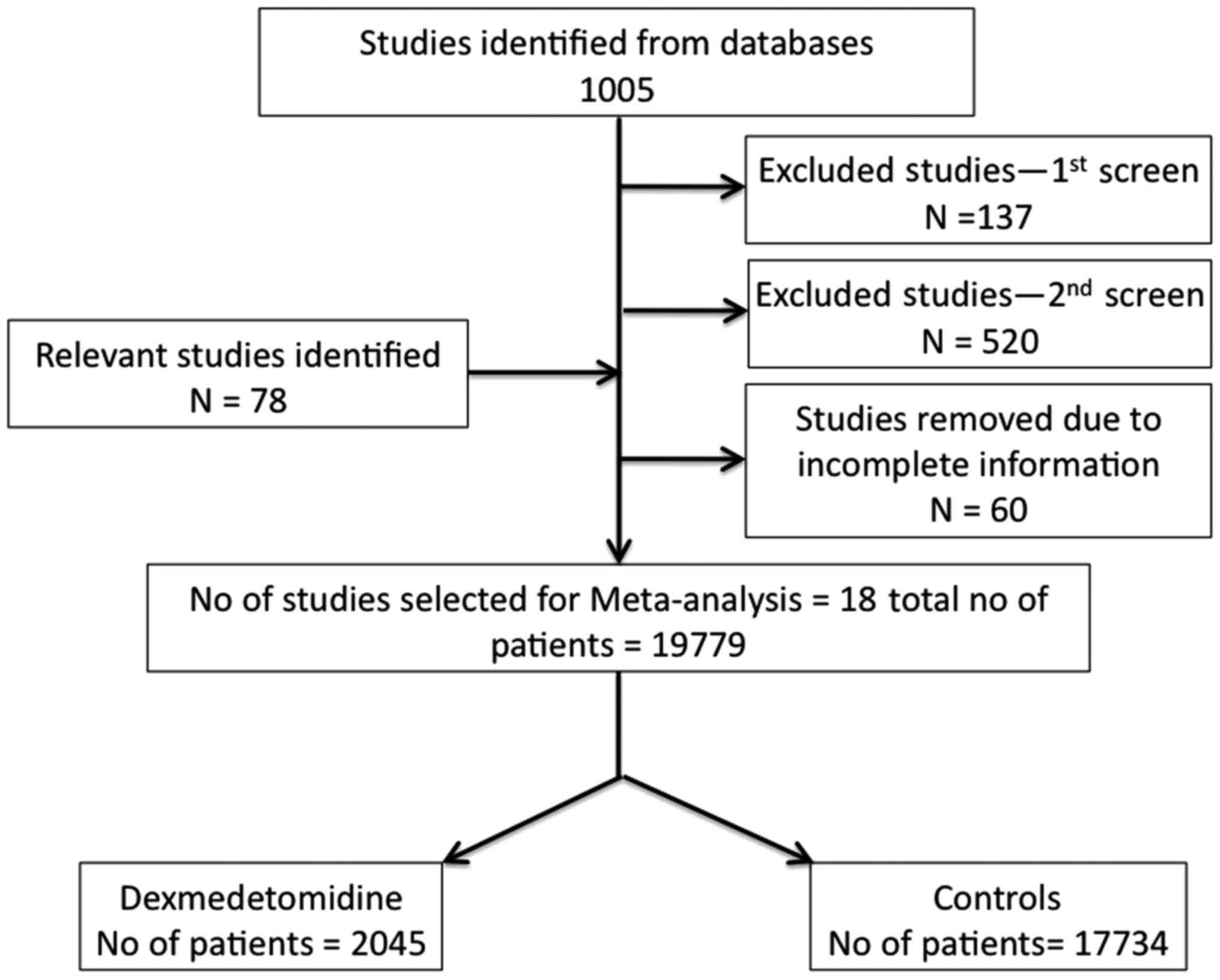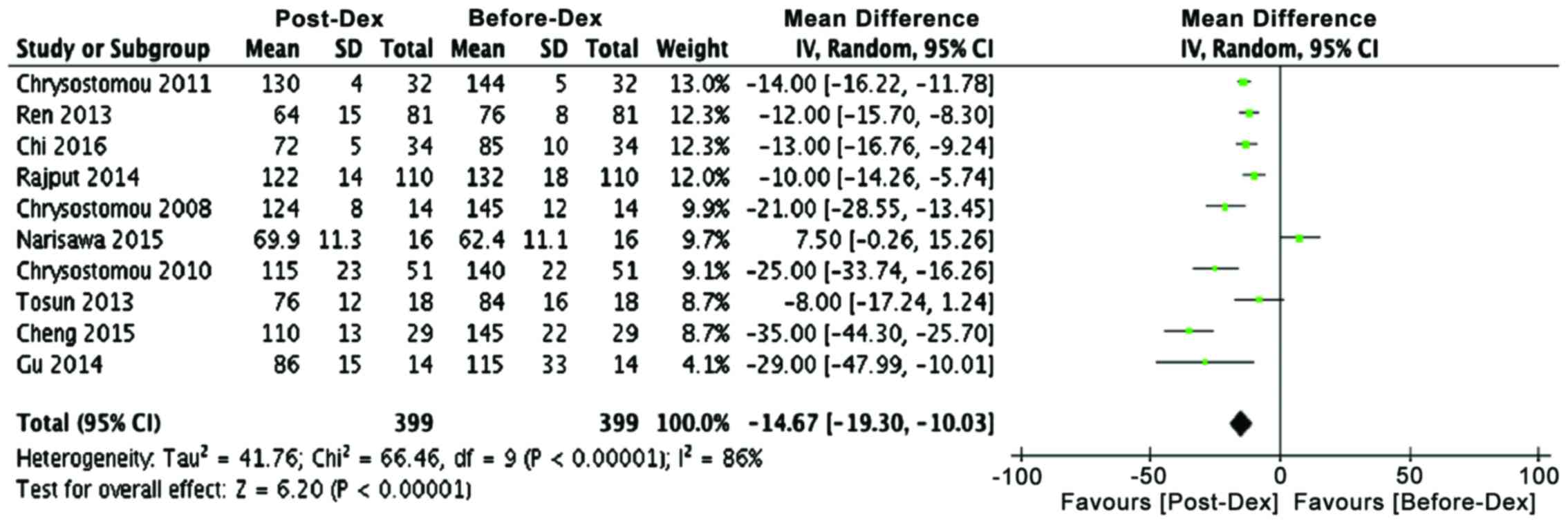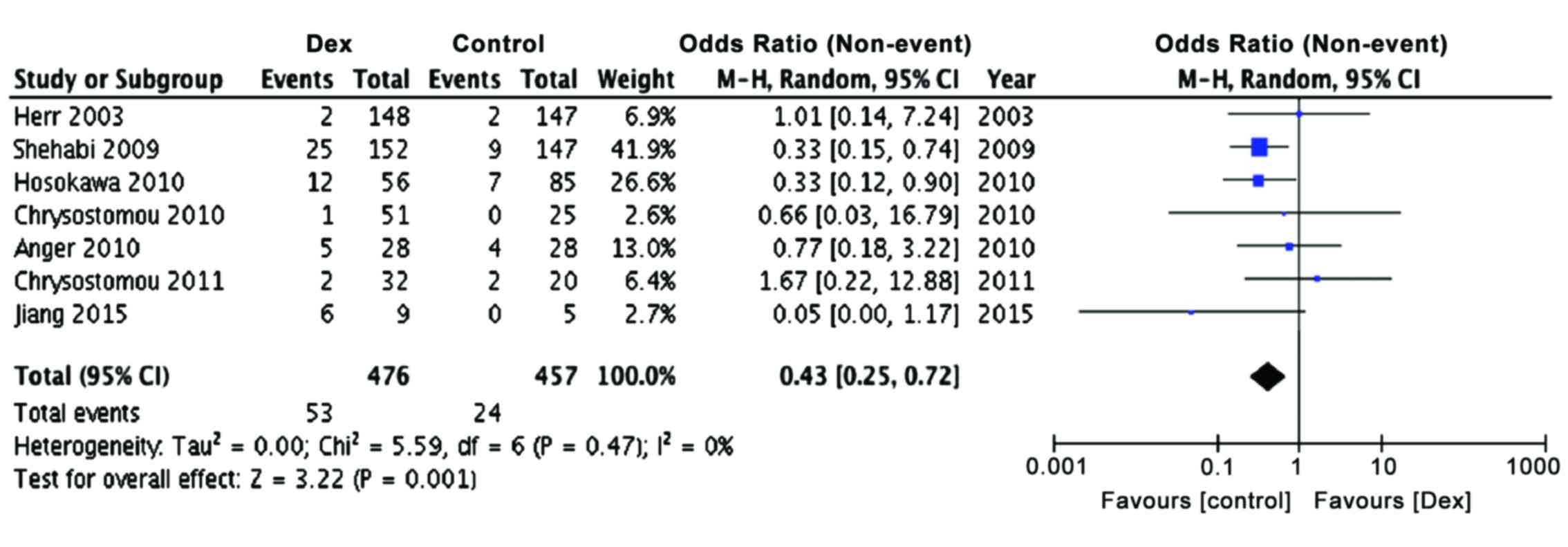|
1
|
Rostagno C, La Meir M, Gelsomino S, Ghilli
L, Rossi A, Carone E, Braconi L, Rosso G, Puggelli F, Mattesini A,
et al: Atrial fibrillation after cardiac surgery: incidence, risk
factors, and economic burden. J Cardiothorac Vasc Anesth.
24:952–958. 2010. View Article : Google Scholar : PubMed/NCBI
|
|
2
|
Ad N, Barnett SD, Haan CK, O'Brien SM,
Milford-Beland S and Speir AM: Does preoperative atrial
fibrillation increase the risk for mortality and morbidity after
coronary artery bypass grafting? J Thorac Cardiovasc Surg.
137:901–906. 2009. View Article : Google Scholar : PubMed/NCBI
|
|
3
|
Zhang X, Zhao X and Wang Y:
Dexmedetomidine: a review of applications for cardiac surgery
during perioperative period. J Anesth. 29:102–111. 2015. View Article : Google Scholar : PubMed/NCBI
|
|
4
|
Sulaiman S, Karthekeyan RB, Vakamudi M,
Sundar AS, Ravullapalli H and Gandham R: The effects of
dexmedetomidine on attenuation of stress response to endotracheal
intubation in patients undergoing elective off-pump coronary artery
bypass grafting. Ann Card Anaesth. 15:39–43. 2012. View Article : Google Scholar : PubMed/NCBI
|
|
5
|
Kunisawa T, Nagata O, Nagashima M,
Mitamura S, Ueno M, Suzuki A, Takahata O and Iwasaki H:
Dexmedetomidine suppresses the decrease in blood pressure during
anesthetic induction and blunts the cardiovascular response to
tracheal intubation. J Clin Anesth. 21:194–199. 2009. View Article : Google Scholar : PubMed/NCBI
|
|
6
|
Keniya VM, Ladi S and Naphade R:
Dexmedetomidine attenuates sympathoadrenal response to tracheal
intubation and reduces perioperative anaesthetic requirement.
Indian J Anaesth. 55:352–357. 2011. View Article : Google Scholar : PubMed/NCBI
|
|
7
|
Lin YY, He B, Chen J and Wang ZN: Can
dexmedetomidine be a safe and efficacious sedative agent in
post-cardiac surgery patients? a meta-analysis. Crit Care.
16:R1692012. View
Article : Google Scholar : PubMed/NCBI
|
|
8
|
Pasin L, Febres D, Testa V, Frati E,
Borghi G, Landoni G and Zangrillo A: Dexmedetomidine vs midazolam
as preanesthetic medication in children: a meta-analysis of
randomized controlled trials. Paediatr Anaesth. 25:468–476. 2015.
View Article : Google Scholar : PubMed/NCBI
|
|
9
|
Mariappan R, Ashokkumar H and Kuppuswamy
B: Comparing the effects of oral clonidine premedication with
intraoperative dexmedetomidine infusion on anesthetic requirement
and recovery from anesthesia in patients undergoing major spine
surgery. J Neurosurg Anesthesiol. 26:192–197. 2014. View Article : Google Scholar : PubMed/NCBI
|
|
10
|
Martin E, Ramsay G, Mantz J and Sum-Ping
ST: The role of the alpha2-adrenoceptor agonist dexmedetomidine in
postsurgical sedation in the intensive care unit. J Intensive Care
Med. 18:29–41. 2003. View Article : Google Scholar : PubMed/NCBI
|
|
11
|
Ji F, Li Z, Young N, Moore P and Liu H:
Perioperative dexmedetomidine improves mortality in patients
undergoing coronary artery bypass surgery. J Cardiothorac Vasc
Anesth. 28:267–273. 2014. View Article : Google Scholar : PubMed/NCBI
|
|
12
|
Wijeysundera DN, Naik JS and Beattie WS:
Alpha-2 adrenergic agonists to prevent perioperative cardiovascular
complications: a meta-analysis. Am J Med. 114:742–752. 2003.
View Article : Google Scholar : PubMed/NCBI
|
|
13
|
Ren J, Zhang H, Huang L, Liu Y, Liu F and
Dong Z: Protective effect of dexmedetomidine in coronary artery
bypass grafting surgery. Exp Ther Med. 6:497–502. 2013.PubMed/NCBI
|
|
14
|
Pan W, Wang Y, Lin L, Zhou G, Hua X and Mo
L: Outcomes of dexmedetomidine treatment in pediatric patients
undergoing congenital heart disease surgery: a meta-analysis.
Paediatr Anaesth. 26:239–248. 2016. View Article : Google Scholar : PubMed/NCBI
|
|
15
|
Herr DL, Sum-Ping ST and England M: ICU
sedation after coronary artery bypass graft surgery:
dexmedetomidine-based versus propofol-based sedation regimens. J
Cardiothorac Vasc Anesth. 17:576–584. 2003. View Article : Google Scholar : PubMed/NCBI
|
|
16
|
Corbett SM, Rebuck JA, Greene CM, Callas
PW, Neale BW, Healey MA and Leavitt BJ: Dexmedetomidine does not
improve patient satisfaction when compared with propofol during
mechanical ventilation. Crit Care Med. 33:940–945. 2005. View Article : Google Scholar : PubMed/NCBI
|
|
17
|
Chrysostomou C, Beerman L, Shiderly D,
Berry D, Morell VO and Munoz R: Dexmedetomidine: a novel drug for
the treatment of atrial and junctional tachyarrhythmias during the
perioperative period for congenital cardiac surgery: a preliminary
study. Anesth Analg. 107:1514–1522. 2008. View Article : Google Scholar : PubMed/NCBI
|
|
18
|
Chrysostomou C, Komarlu R, Lichtenstein S,
Shiderly D, Arora G, Orr R, Wearden PD, Morell VO, Munoz R and
Jooste EH: Electrocardiographic effects of dexmedetomidine in
patients with congenital heart disease. Intensive Care Med.
36:836–842. 2010. View Article : Google Scholar : PubMed/NCBI
|
|
19
|
Chrysostomou C, Sanchez-de-Toledo J,
Wearden P, Jooste EH, Lichtenstein SE, Callahan PM, Suresh T,
O'Malley E, Shiderly D, Haney J, et al: Perioperative use of
dexmedetomidine is associated with decreased incidence of
ventricular and supraventricular tachyarrhythmias after congenital
cardiac operations. Ann Thorac Surg. 92:964–972; discussion 972.
2011. View Article : Google Scholar : PubMed/NCBI
|
|
20
|
Shehabi Y, Grant P, Wolfenden H, Hammond
N, Bass F, Campbell M and Chen J: Prevalence of delirium with
dexmedetomidine compared with morphine based therapy after cardiac
surgery: a randomized controlled trial (DEXmedetomidine COmpared to
Morphine-DEXCOM Study). Anesthesiology. 111:1075–1084. 2009.
View Article : Google Scholar : PubMed/NCBI
|
|
21
|
Anger KE, Szumita PM, Baroletti SA,
Labreche MJ and Fanikos J: Evaluation of dexmedetomidine versus
propofol-based sedation therapy in mechanically ventilated cardiac
surgery patients at a tertiary academic medical center. Crit Pathw
Cardiol. 9:221–226. 2010. View Article : Google Scholar : PubMed/NCBI
|
|
22
|
Hosokawa K, Shime N, Kato Y, Taniguchi A,
Maeda Y, Miyazaki T and Hashimoto S: Dexmedetomidine sedation in
children after cardiac surgery. Pediatr Crit Care Med. 11:39–43.
2010. View Article : Google Scholar : PubMed/NCBI
|
|
23
|
Ji F, Li Z, Nguyen H, Young N, Shi P,
Fleming N and Liu H: Perioperative dexmedetomidine improves
outcomes of cardiac surgery. Circulation. 127:1576–1584. 2013.
View Article : Google Scholar : PubMed/NCBI
|
|
24
|
Tosun Z, Baktir M, Kahraman HC, Baskol G,
Guler G and Boyaci A: Does dexmedetomidine provide cardioprotection
in coronary artery bypass grafting with cardiopulmonary bypass? A
pilot study. J Cardiothorac Vasc Anesth. 27:710–715. 2013.
View Article : Google Scholar : PubMed/NCBI
|
|
25
|
Gu H, Liu J and Wu C: Impact of
dexmedetomidine versus propofol on cardiac function of children
undergoing laparoscopic surgery. Int J Clin Exp Med. 7:5882–5885.
2014.PubMed/NCBI
|
|
26
|
Rajput RS, Das S, Makhija N and Airan B:
Efficacy of dexmedetomidine for the control of junctional ectopic
tachycardia after repair of tetralogy of Fallot. Ann Pediatr
Cardiol. 7:167–172. 2014. View Article : Google Scholar : PubMed/NCBI
|
|
27
|
Turan A, Bashour CA, You J, Kirkova Y,
Kurz A, Sessler DI and Saager L: Dexmedetomidine sedation after
cardiac surgery decreases atrial arrhythmias. J Clin Anesth.
26:634–642. 2014. View Article : Google Scholar : PubMed/NCBI
|
|
28
|
Narisawa A, Nakane M, Kano T, Momose N,
Onodera Y, Akimoto R, Kobayashi T, Iwabuchi M, Okada M, Miura Y, et
al: Dexmedetomidine sedation during the nighttime reduced the
incidence of postoperative atrial fibrillation in cardiovascular
surgery patients after tracheal extubation. J Intensive Care.
3:262015. View Article : Google Scholar : PubMed/NCBI
|
|
29
|
Jiang L, Ding S, Yan H, Li Y, Zhang L,
Chen X, Yin X, Liu S, Tang X and Zhang J: A retrospective
comparison of dexmedetomidine versus midazolam for pediatric
patients with congenital heart disease requiring postoperative
sedation. Pediatr Cardiol. 36:993–999. 2015. View Article : Google Scholar : PubMed/NCBI
|
|
30
|
Cheng X, Zuo Y, Zhao Q, Gu E and Huang Y:
Comparison of the effects of dexmedetomidine and propofol on
hemodynamics and oxygen balance in children with complex congenital
heart disease undergoing cardiac surgery. Congenit Heart Dis.
10:E123–E130. 2015. View Article : Google Scholar : PubMed/NCBI
|
|
31
|
Chi X, Liao M, Chen X, Zhao Y, Yang L, Luo
A and Yang H: Dexmedetomidine attenuates myocardial injury in
off-pump coronary artery bypass graft surgery. J Cardiothorac Vasc
Anesth. 30:44–50. 2016. View Article : Google Scholar : PubMed/NCBI
|
|
32
|
Mikawa K, Nishina K, Maekawa N and Obara
H: Comparison of nicardipine, diltiazem and verapamil for
controlling the cardiovascular responses to tracheal intubation. Br
J Anaesth. 76:221–226. 1996. View Article : Google Scholar : PubMed/NCBI
|
|
33
|
Biccard BM, Goga S and de Beurs J:
Dexmedetomidine and cardiac protection for non-cardiac surgery: a
meta-analysis of randomised controlled trials. Anaesthesia.
63:4–14. 2008. View Article : Google Scholar : PubMed/NCBI
|
|
34
|
Constantin JM, Momon A, Mantz J, Payen JF,
De Jonghe B, Perbet S, Cayot S, Chanques G and Perreira B: Efficacy
and safety of sedation with dexmedetomidine in critical care
patients: a meta-analysis of randomized controlled trials. Anaesth
Crit Care Pain Med. 35:7–15. 2016. View Article : Google Scholar : PubMed/NCBI
|
|
35
|
Tobias JD: Dexmedetomidine and ketamine:
an effective alternative for procedural sedation? Pediatr Crit Care
Med. 13:423–427. 2012. View Article : Google Scholar : PubMed/NCBI
|




















